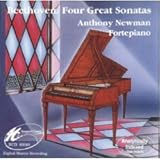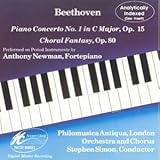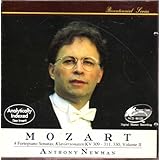Gramophone Magazine has recently posted its nominees for its best records of 2014 in various categories. One has caught my eye - or rather, ear. It's a performance of a pair of Beethoven's Piano Trios #6, op. 70, and #7, op. 97 ("Archduke"), with Isabelle Faust on violin, Jean-Guihen Queyras on cello and Alexander Melnikov on fortepiano (Harmonia mundi, 2014). While Faust and Melnikov have generally recorded with modern instruments, here both have switched over to period instruments.
![Image]()
The record has received quite dazzling reviews. Here's a typical one:
A few years ago, it's a recording that I likely would have avoided. While I have been a fan of original instruments and historically informed performances for nearly 40 years, I have been rather slow to embrace performances with fortepiano. It has been often berated as sounding tinny, too much like a "toy piano." Yet it was the instrument that Haydn and Mozart and even Beethoven wrote for (though, I gather, that in Beethoven's case, instrument makers were making rapid strides even during his lifetime so that the sound of the best instruments was changing even as he was composing his masterpieces). Well, I'm now sold on it.
Please note the title: "In praise." It's ok to give critical reactions. But I'm interested in people's positive responses to the instrument, or their shift to the positive in their response to the instrument. So my questions:
(1) What have been your evolving experiences with listening to the fortepiano?
(2) What recordings have changed how you heard the instrument in a positive way-and, as a consequence, how you hear the music in a new way?
(3) What recordings exemplify the instrument at its best?

The record has received quite dazzling reviews. Here's a typical one:
Note his emphasis on the fortepiano as a "gypsy dulcimer". Melnikov plays here on a restored 1826 Graff fortepiano. I've listened to this on spotify as well as clips on Harmonia mundi's website. The sound is extraordinary and the music itself has a freshness that I've not heard. (And I much admire the old Beaux Arts Trio performance of these). So it's now at the top of my wishlist.
A few years ago, it's a recording that I likely would have avoided. While I have been a fan of original instruments and historically informed performances for nearly 40 years, I have been rather slow to embrace performances with fortepiano. It has been often berated as sounding tinny, too much like a "toy piano." Yet it was the instrument that Haydn and Mozart and even Beethoven wrote for (though, I gather, that in Beethoven's case, instrument makers were making rapid strides even during his lifetime so that the sound of the best instruments was changing even as he was composing his masterpieces). Well, I'm now sold on it.
Please note the title: "In praise." It's ok to give critical reactions. But I'm interested in people's positive responses to the instrument, or their shift to the positive in their response to the instrument. So my questions:
(1) What have been your evolving experiences with listening to the fortepiano?
(2) What recordings have changed how you heard the instrument in a positive way-and, as a consequence, how you hear the music in a new way?
(3) What recordings exemplify the instrument at its best?


















